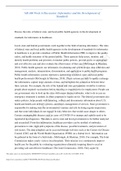This study source was downloaded by 100000829957125 from CourseHero.com on 09 -12-2021 02:21:25 GMT -05:00 https://www.coursehero.com/file/77308385/NR -360-Week -6-Dicussion -Postdocx/ NR-360 Week 6 Discussion: Informatics and the Development of Standards Discuss the roles of federal, state, and local public health agencies in the development of standards for informatics in healthcare. Local, state and federal governments work together in the field of nursing informatics. The roles of federal, state and local public health agencies in the development of standards for informatics in healthcare is to provide a d atabase of Public Health Information (PHI) to improve the quality, safety, and health outcomes of the general public. These agencies help assess, monitor, and identify health problems and priorities, formulate public policies, provide access to appropriate and cost -effective care and also evaluate the effectiveness of that care (McGonigle & Mastrian, 2018). Public health agencies use informatics for planning and system design, data collection and management, analysis, interpretation, dissemination, and appl ication to public health programs. Public health information systems represent a partnership of federal, state, and local public health professionals (McGonigle & Mastrian, 2018). These systems are able to rapidly exchange the information, capture large amounts of data, and strengthen the connection between these three systems. For example, the role of the federal and state governments would be to inform people about required vaccinations before traveling or required tests for employment. People can use g overnment sites to look up the cities with major disease outbreaks, what to do in case an emergency treatment is needed, or what symptoms to watch out for. The federal government also makes policies, helps people with financing, collects and disseminates i nformation about U.S. health and health care delivery systems, and directs management of services. State government is responsible for making sure the environment is sanitary and safe by doing regular inspections, and that some individuals do not engage in risky behaviors that would cause danger to others. Certain communicable diseases such as cases of COVID -19 or mumps and syphilis need to be reported to local agencies. This data is sent to state and local governments to be further analyzed and researched. From this information, healthcare providers can be notified of outbreaks, precautions to take, signs and symptoms of the disease, possible treatments, and prevention of risk factors. The data compiled can be accessed through web sites such as the Centers for Disease Control (CDC) and the World Health Organization (WHO) on a federal level. Information can be gathered in the form of a field study. (McGonigle, & Mastrian, 2018). For example, The Joint Commission makes yearly visits to local hospitals. Their mission is to continuously improve health care for the public by evaluating organizations ultimately inspiring them to excel in providing safe and effective healthcare (The Joint Commission, 2020). They aspire by This study source was downloaded by 100000829957125 from CourseHero.com on 09 -12-2021 02:21:25 GMT -05:00 https://www.coursehero.com/file/77308385/NR -360-Week -6-Dicussion -Postdocx/ developing standards for nursing by collect ing data from various sources and implementing them on the local level. Staff at the CDC and other federal agencies, state and local health departments, and workers from all walks of public health life come together to educate leaders




